
There has been something of a tech revolution in the hospitality industry over the past few years.
What started with a shift from bulky and expensive legacy POS systems over to cheaper, more customisable cloud-based platforms has seen the freedom of these cloud-based POS platforms harnessed to develop the type of tech that can make a major difference to your business’ everyday operations and bottom line.
When the lockdowns hit, it felt like the shackles were taken off tech and it was allowed to showcase its worth to a world that might have been a little apprehensive of such radical operating changes.
In this blog, we’ll highlight some of the tech innovations that have proved themselves a huge help to the hospitality industry for operators and customers alike.
- The ordering process
- Kitchen Display Screen (KDS)
- Payments
- Inventory management (including recipe building)
- Automated Marketing
- Artificial Intelligence (AI)
- Booking platforms
Want to know more about the future of hospitality?
Lightspeed’s 2024 Hospitality Report gives you every insight into what hospitality operators and customers want in 2024. Download your free report today.
Barriers
Let’s address the elephant in the room.
There are, inevitably, going to be some barriers when it comes to adopting new tech for your business. It’s reasonable for operators to have worries and doubts over whether a change will impact them negatively and these feelings are usually more present when it comes to new tech. There is the worry that a certain human touch will be missing, taking with it part of the soul of hospitality business.
This was echoed in our recent Hospitality Report, amongst other concerns such as staff training, cost and integration.
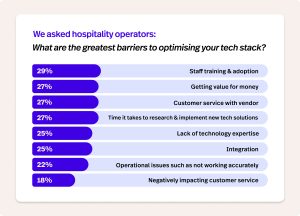
And while it would be foolish to dismiss these concerns completely, we can go some ways towards easing any concerns you might have about tech’s negative impacts, instead highlighting how its positive changes can give you the best of both worlds: operational efficiency with better (and still very much human) customer service.
Now, onto the list.
1. The ordering process
This is where a lot of this recent development got its start.
When the lockdowns hit, hospitality businesses could no longer seat customers in their venues. This led to some very quick, sudden pivots towards a takeaway only setup, something that a lot of businesses—like cafes or fine dining restaurants—might not have had set up.
Pair this with the introduction of QR codes into everyday society, showcasing their speed and versatility, and a tech-based solution began to emerge.
Businesses started setting up their menus online, creating digital copies in a world where physical touch had become taboo, and the success of these QR code menus saw them stick around once the world opened up again.
Ordering via an app
Now, with a QR code on each table linked to your venue’s personal ordering app, customers can order and pay as many times as they like without taking up the valuable time of your floor staff.
“If customers are pre-ordering you get an extra 20 seconds to have a conversation (instead of processing a sale)”
– Andrew Pearce, Director & Co-founder, Hello Sarnie.
The same goes for customers who are after takeaway or delivery. With the entire ordering process—from customisable, branded menus, upsells and suggestions through to payment—housed within an app, your staff’s time is freed up for more important things.
In fact, in Lightspeed’s recent Hospitality Report, respondents said that they saved an average of 1 hour 36 minutes per day thanks to customers self-ordering via an ordering app.
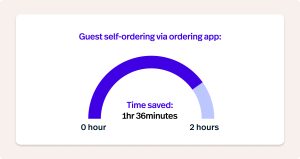
POS system for ordering
But what about the customers that don’t want to order via an app?
There is still a tech solution that can help here too.
One of the major benefits of a cloud-based POS is that it lives entirely in the abstract with no physical representation in the real world beyond what’s displayed on the screen of a tablet or phone. And being so lightweight and portable, they’re easy for your staff to carry around on their person during service.
“We’ve freed up about 30% of our staff’s time … get orders into the kitchen—get them into the bar—but actually spend more time with our guests.”
– Kristian Klein, Director, Mr. Miyagi.
With Lightspeed Restaurant, your staff can even be guided through the ordering process by the tech itself, suggesting appropriate or popular upsells as orders are punched in and timing each course so that everything gets to the customers exactly when it’s meant to.
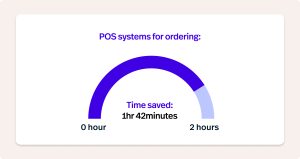
2. Kitchen Display Screen (KDS)
Another handy piece of tech is a Kitchen Display Screen (KDS). This is a great replacement for physical dockets in a busy kitchen where paper can be prone to slipping underneath a fridge at the whim of a sudden breeze or becoming smudged by an errant finger when the team is deep in the weeds.
With a KDS, everything is displayed clearly including timings, course and any modifiers. No finger can smudge it, not even a gale could blow the information beneath the fridge. It all stays on the screen, for all to see until you decide it’s ready to go.
You’ll never lose an order again.
3. Payments
Another part of everyday life that was accelerated by the lockdown restrictions was our march towards becoming a cashless society.
Now, there are many schools of thought about whether or not this is a good thing, but regardless of where you stand, for the hospitality industry it has been overwhelmingly transformative.
According to Statista, in Australia in 2023 cash was the preferred payment method only 7% of the time. Contrast this to 88% for credit/debit cards or mobile payments and the transition to cashlessness is almost complete.
This opens up the possibility for payments to be taken away from a centralised, static POS without the need to carry around enough cash to offer change.
And with these digital payments integrated directly to the POS, there’s no time wasted keying in amounts multiple times on different devices like the POS or the payments terminal itself, and no human error resulting in an unbalanced till come cashup time.
“We’ve had Lightspeed payments now for a month, and it’s saved us double the time because you only input into Lightspeed and boom, the payments are there for the customer. It’s all integrated through the POS system properly now.”
– Adam, Owner, St. Jude’s.
Respondents in our Hospitality Report estimated that taking payments that are synced with their POS saves them around 1 hour 39 minutes daily.
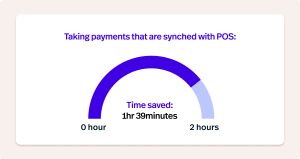
4. Inventory management (including recipe building)
Staying on top of your inventory is one of the most time-consuming tasks when it comes to running a hospitality business. It’s also something that inadvertently has to be done after service when staff are tired and prone to making mistakes.
By handing the reins over to your tech to handle your inventory, these issues are negated.
Inventory can be updated live as things are sold and a running total of what needs to be ordered to get back to par can be tallied and ordered automatically at the end of each service, directly to your suppliers and directly from your POS, saving your staff valuable time come close and saving you on staffing costs—around 1 hour 40 minutes per day!
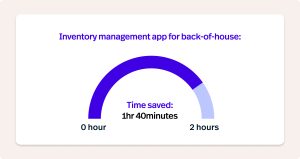
Your tech can also cut down on your COGS with smart recipe building tools, ensuring that once a recipe and its ingredients are finalised, everything stays consistent whenever it’s made.
“To be able to go, oh, this is what we have on the menu today. This is what is available. I know exactly how much of it we have mid-service. The chefs can say, oh, actually, we’ve only got two left of that. And you go, okay, cool. Updated it, done.”
– Tom Bruce, Co-Founder, Freshwater Brewing Co.
5. Automated Marketing
Marketing your venue is an important step in getting your name out to not only as many people as possible, but also the most appropriate people in order to drive them through your doors.
The issue is, marketing is a difficult skill to master. The marketing landscape is saturated with everybody vying for their voice to be heard above all others, making it harder than ever to stand out from the crowd and get noticed.
And because of its multifaceted nature, with multiple platforms and mediums to cover every angle and ensure your money is well spent, a successful marketing campaign takes a lot of time away from running your venue.
There are tech solutions to this problem, such as an integration with a third party like me&u.
By collecting some basic information from your customers when they make a booking or a payment, you can instantly create an audience specific to your business, narrowing down your focus and boosting the likelihood of your next marketing campaign hitting.
And with an automated marketing or loyalty program, our respondents estimated they saved around 1 hour 44 minutes daily.
Huge.
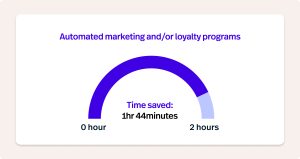
6. Artificial Intelligence (AI)
“…the experience is going to be human still.”
Like most things happening in the world today, AI has a seat at the table and this is no different for your hospitality business.
The tech is still in its infancy, but the rapid development in the area so far promises a big role for AI in the future of the hospitality industry.
And whilst a lot of what AI is capable of can seem like a threat to the jobs and livelihoods of actual human beings, the reality is far less sinister. Instead of viewing AI as a threat, treat it as an ally—something that can take over the mundane, time-consuming jobs that you hate, leaving you with the time to focus on the jobs that you love.
This is something touched upon at our recent Table Talks event in Melbourne, with Adrian Osman, the COO and Co-founder of hospitality ordering platform me&u, sharing his thoughts on AI within the industry:
“There’s an amazing defence built into the romance of hospitality that can never be replaced by technology. It will always be on the peripheral. You can do cool stuff with AI, you can personalise the menu or the experience, there’ll be robots making coffee more, for sure, but the experience is going to be human still.”
7. Booking platforms
Your venue’s reservations can also be handled by your tech, freeing up time for your staff to prepare for the upcoming service instead of being tied to the phone chasing down confirmations from each of your guests.
How much time? According to the Hospitality Report around 1 hour 39 minutes per day.
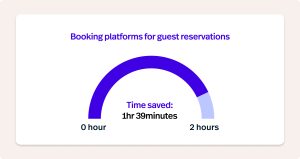
Your tech can handle dietary requirements and collect any information you think will help towards creating the best dining experience for your guests.
Platforms such as OpenTable will do all of the heavy lifting for you, automating your table status’ for a smoother service, collecting customer data for more-effective marketing and even keep track of revenue per diner so you don’t have to.
“We really value the integrations that work with one another. You know, integrating with OpenTable is very good. It was a no-brainer really, changing.”
– Simone Staltari, General Manager, DOC Group.
Hospitality’s tech-based future
The integration of new and emerging technologies has undeniably transformed the hospitality industry, streamlining operations and enhancing customer experiences.
From the advent of cloud-based POS systems to the widespread use of QR codes for ordering and the convenience of digital payments, tech solutions have proven to be indispensable tools. These innovations have not only saved time and reduced errors but also allowed businesses to adapt quickly to changing circumstances.
And as these technologies continue to evolve, the industry is poised to benefit even further, with AI playing a supportive role in managing mundane tasks and freeing up staff to focus on what truly matters: creating memorable experiences for their guests. By embracing these advancements, hospitality businesses can stay ahead of the curve, ensuring they remain competitive in an ever-changing landscape. While the future may hold more technological surprises, the essence of hospitality—the human connection—will always remain at the heart of the industry.
Want more insights on what the future holds for the hospitality industry?
Download Lightspeed’s free 2024 Hospitality Report now

News you care about. Tips you can use.
Everything your business needs to grow, delivered straight to your inbox.


